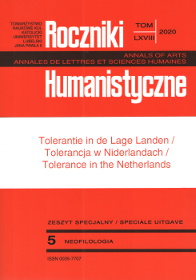De paradoxale strijd van Esperanto voor tolerantie
Abstrakt
Paradoksalna walka esperanto o tolerancję
W artykule zbadano wpływ tolerancji na ewolucję esperanto jako języka sztucznego. Idea tolerancji, osadzona w podstawowych wartościach esperanto, ucierpiała w wyniku społecznej ewolucji narastającej nietolerancji. Przeanalizowane zostały najważniejsze czynniki historyczne, które przyczyniły się do rosnącej nietolerancji wobec użytkowników esperanto.
In dit artikel wordt onderzocht welke invloed tolerantie heeft uitgeoefend in de evolutie van het Esperanto als artificiële taal. Het idee van tolerantie, ingebed in de fundamentele waarden van het Esperanto, kreeg te lijden onder een maatschappelijke evolutie van toenemende intolerantie. De belangrijkste historische factoren die hiertoe hebben bijgedragen worden onder de loep genomen.
Bibliografia
Boulton, Marjorie. Zamenhof. Creator of Esperanto. Routledge and Kegan Paul, 1960.
Brustein, William I. Roots of Hate – Anti-semitism in Europe before the Holocaust. Cambridge University Press, 2003.
Clément, Michel. L’homaranisme. De la sagesse d’Hillel aux Lumières juives. Paris, Ulmus Americana Editio, 2010.
Eco, Umberto. La recherche de la langue parfaite dans la culture européenne. Traduit de l’italien par Jean-Paul Manganaro, Éditions du Seuil, 1994.
Gobbo, Federico. “Beyond the Nation-State? The Ideology of the Esperanto Movement between Neutralism and Multilingualism”. Social Inclusion, vol. 5, nr 4, 2017, pp. 38–47.
Godin, Christian. “Sens de la contre-utopie”. Cités. Philosophie, Politique, Histoire, Utopies, n° 42, 2010, pp. 61-68.
Kim, Young S. Esperanto and Global Identity in Constructing World Culture, International Nongovernmental Organizations since 1875. Stanford University Press, 1999.
Korzhenkov, Aleksander. Zamenhof: The Life, Works and Ideas of the Author of Esperanto. English translation and notes by Ian M. Richmond, ed. Humphrey Tonkin, Mondial in cooperation with Universal Esperanto Association, 2009.
Lins, Ulrich. Die gefährliche Sprache – Die Verfolgung der Esperantisten unter Hitler und Stalin. Gerlingen, Bleicher Verlag, 1988.
Lins, Ulrich. The work of the Universal Esperanto Association for a more peaceful world. Esperanto Documents, 2000.
Madella, Alessandra. “The Light Cloak of the Saint: The Changing Rhetorical Situations of Esperanto’s ‘Internal Idea’ and its Relevance to Contemporary Problems”. Poroi. An Interdisciplinar Journal of Rhetorical Analysis and Invention, vol. 14, nr 2, 2019, article 4. ir.uiowa.edu/poroi/vol14/iss2/4. Geraadpleegd op 4.03.2019.
Oostendorp, Marc van. Een wereldtaal. De geschiedenis van het Esperanto. Amsterdam, Athenaeum – Polak & Van Gennep, 2004.
Redl, Sabina. Verfolgung der Esperanto-Anhänger im Dritten Reich. Stuttgart, Gerlingen, 1988.
Rousseau, André. “Les avatars des projets de langue universelle au tournant du siècle (1880-1930)”. Germanica, vol. 33, 2003, pp. 213-230, journals.openedition.org/germanica/1840. Geraadpleegd op 4.03.2019.
Zamenhof, Ludwig Lejzer. Ĝis la homaranismo 1896-1906, ed. Kanzi Itô, Ludovikito 1990. (Iom reviziita plena verkaro de L. L. Zamenhof. Originalaro 2).
Copyright (c) 2020 Roczniki Humanistyczne

Utwór dostępny jest na licencji Creative Commons Uznanie autorstwa – Użycie niekomercyjne – Bez utworów zależnych 4.0 Międzynarodowe.





